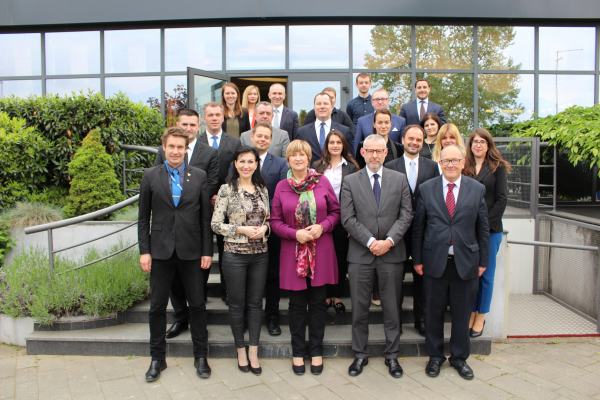ECR localism conference in Vukovar calls for a bottom-up and localist EU Cohesion Policy

The third edition of the Localism conference focusing on cohesive development in Europe took place today in Vukovar, Croatia's Slavonia region. Organised by the European Conservatives and Reformists (ECR) Group in the European Committee of the Regions (CoR), the event brought together locals with local and regional politicians and experts from across Europe. Best-practices and lessons-learnt were shared. Those participating included the CoR ECR Group President Rob Jonkman, Croatian ECR Member of the European Parliament Ruža Tomašić, Deputy Mayor of Vukovar Marijan Pavliček and the European Young Conservatives President Keti Mamulashvilli. Prior to the start of the conference, participants visited the war memorial and payed their respect to the victims who lost their lives during the Homeland War in 1991 in Vukovar.
This year's localism conference organised in Vukovar, Croatia brought together local and regional politicians and experts with representatives of the European Parliament. Croatian, Czech, Dutch, Lithuanian and Polish Case studies on the use of the EUs Cohesion Funds were presented. Best-practices as well as lessons-learnt were shared and their implications for the current programming period that runs till 2020 was analysed, as was their implications for the future of the EUs cohesion policy post-2020.
Underlining that the conference showed the need for reform, ECR Group President Alderman Rob Jonkman (Alderman in Opsterland, Netherlands) noted that "the level of reconstruction and development that has taken place in Vukovar since the war, is impressive. Our conference showed that while EU Funds have helped areas like Vukovar, there are still obstacles in place that prevent localities from making the most of funds at their disposal. What we need is a reformed and transparent cohesion policy better suited to the needs of our local communities. We need a one-stop-shop for beneficiaries so that they can ask any questions they may have about applications and use of Funds. We also need to step-up efforts to avoid any misuse of Funds."
Marijan Pavliček said "Vukovar's recent history is very tragic. It was the area of Croatia most heavily affected by the Homeland War and saw most of its infrastructure and buildings destroyed. Our town had to be rebuilt and is recovering well from the effects of the war. So far, EU support has been limited. Today's exchange of views has enabled us in Vukovar to share ideas and draw lessons from the experiences of others. It is the first time that we have had such an opportunity in Vukovar and I look forward to repeating it. I hope that today's conclusions on cohesive development will help shape the policies' future and contribute to the better use of EU Funds in the Slavonia region."
Mrs Ruža Tomašić MEP said "when Croatia joined the EU in 2013, we expected our membership to benefit our country. Unfortunately, we encountered many challenges with complicated EU procedures and we didn't have the necessary infrastructure needed to make the most of the available EU Funds. To address this, we need to simplify procedures and develop the necessary administrative tools and capacity. We also need to ensure that the technical assistance is better channelled to our local and regional authorities. To achieve shared goals, the level of trust between the different layers of government should be increased and we need to enhance collaboration between the public and private sectors."
The EU Parliament survey published on 27 April showed that there are 9 member states (Austria, Croatia, Cyprus, Czech Republic, Greece, Hungary, Italy, Latvia and Slovenia) in which less than 49% of the population believe that EU membership is a good thing. This means that these 9 member states are more critical of EUs benefits than the UK, given that survey showed that 49% of the citizens in the UK believed that EU membership is a good thing.
Drawing the link with the ongoing debate on the future of the European Union, Alderman Jonkman stated that "it is clear that the EUs Cohesion Policy brings added-value but the results could be much more positive. For its success, we need to reform and improve the EUs system of governance. Local communities should be at the heart of the project and this can only be done if we empower them. Therefore, the future of Europe must be a decentralised and localist one."
Referring to the General Affairs Council meeting of 25 April, Alderman Jonkman said "while I do agree that the success stories of EU projects need to be better communicated to citizens, the issue is much deeper than communication. The Cohesion policy is simply not delivering its intended results and therefore needs to be reformulated."
Currently, the EU dedicates more than 350 billion Euros to its Regional and Cohesion Policy, which is one third of the EUs budget. The EUs European Strategy and Policy Analysis System study on global trends 2030 and the 6th Cohesion Policy both showed that global trends are having a varied impact on localities, with some prospering and other facing challenges. The results show that the EUs Cohesion Policy has not helped mitigate the challenges and that disparities between the richest and poorest regions remain.

